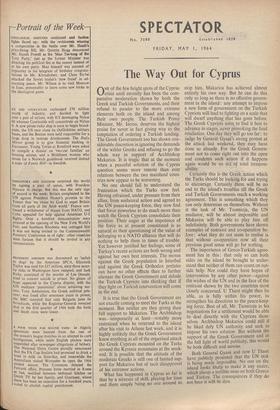The Way Out for Cyprus
ONE of the few bright spots of the Cyprus crisis until recently has been the com- parative moderation shown by both the Greek and Turkish Governments, and their refusal to pander to the more extreme elements both on the island and among their own people. The Turkish Prime Minister, Mr. Inonu, deserves the highest praise for never in fact giving way to the temptation of ordering a Turkish landing. The Greek Government too has shown con- siderable discretion in ignoring the demands of the wilder Greeks and refusing to go the whole way in support of Archbishop Makarios. It is tragic that at the moment when a peaceful solution of the Cyprus question seems more remote than ever relations between the two mainland coun- tries now appear to be worsening.
No one should fail to understand the frustration which the Turks now feel. Having refrained, under pressure from their allies, from unilateral action and agreed to the UN peace-keeping force, they now find that force powerless to do much more than watch the Greek Cypriots consolidate their position. Their anger at the impotence of the force as at present constituted is as natural as their questioning of the value of belonging to a NATO alliance that will do nothing to help them in times of trouble. Yet however justified her feelings, some of Turkey's recent actions are both wrong and against her own best interests. The moves against the Greek population in Istanbul and against the Greek Orthodox prelates can have no other effects than to further alienate the Greek Government and delude the Turkish Cypriots into thinking that if they fight on Turkish intervention will come in the end.
It is true that the Greek Government are not exactly coming to meet the Turks at the moment. But neither are they giving their full support to Makarios. The Archbishop was—temporarily at least—notably more restrained when he returned to the island after his visit to Athens last week, and it is highly unlikely that the Greek Government knew anything at all of the organised attack the Greek Cypriots mounted on the Turks around the Kyrenia mountains at the week- end. It is possible that the attitude of the moderate Greeks is still one of limited sup- port for Makarios but of tacit disapproval of his extremer actions. What has happened in Cyprus so far is that by a mixture of skill, playing for time and there simply tying no one around to stop him, Makarios has achieved almost entirely his own way. But he can do this only so long as there is no effective govern- ment in the island : any attempt to impose a new form of government on the Turkish Cypriots will lead to fighting on a scale that will dwarf anything that has gone before. The .Greek Cypriots seem to find it best to advance in stages, never provoking the final retaliation. One day they will go too far: to judge by General Gyani's strong protest at the attack last weekend, they may have done so already. For the Greek Govern- ment not to come right out into the open and condemn such action if it happens again would be an act of total irrespon- sibility.
Certainly this is the Greek action which the Turks should be looking for and trying to encourage. Certainly there will be no end to the island's troubles till the Greek and Turkish Governments reach a working agreement. This is something which they can only determine on themselves. Without it the task of Mr. Tuomioja, the UN mediator, will be almost impossible and Makarios will be able to play him off indefinitely. Both governments have shown examples of restraint and co-operation be- fore: what they do not seem to realise is that without co-operation now all their previous good sense will go for nothing. The importance of Greco-Turkish agree- ment lies in this : that only so can both sides on the island be brought to under- stand that neither of them can count on out- side help. Nor could they have hopes of intervention by any other power—against the wishes of the UN and in the face of the restraint shown by the two countries most closely concerned. U Thant might then be able, as is fully within his power, to strengthen his directives to the peace-keep- ing force. Best of all, Mr. Tuomioja in his negotiations for a settlement would be able to deal directly with the Cypriots them- selves. Archbishop Makarios could still if he liked defy UN authority and seek to impose his own solution. But without the support of the Greek Government and in the full light of world publicity, this would be both difficult and unwise.
Both General Gyani and now U Thant have publicly protested that the UN task is being made impossible. No one on the island looks likely to make it any easier, which places a terrible onus on both Greece and Turkey. The consequences if they do not bear it will be dire.














































 Previous page
Previous page